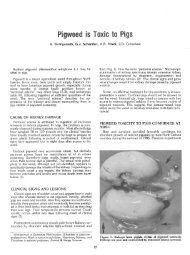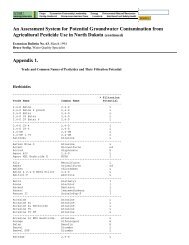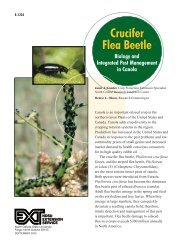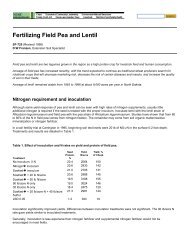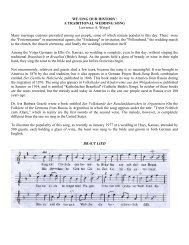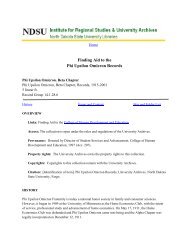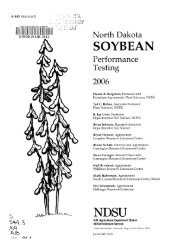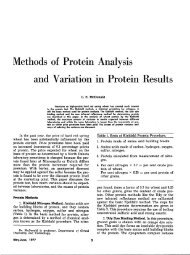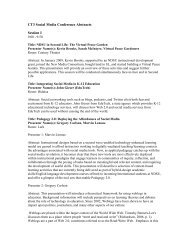GERMAN-RUSSIAN TRADITIONS By Lawrence Weigel Nicknames In
GERMAN-RUSSIAN TRADITIONS By Lawrence Weigel Nicknames In
GERMAN-RUSSIAN TRADITIONS By Lawrence Weigel Nicknames In
You also want an ePaper? Increase the reach of your titles
YUMPU automatically turns print PDFs into web optimized ePapers that Google loves.
<strong>GERMAN</strong>-<strong>RUSSIAN</strong> <strong>TRADITIONS</strong><strong>By</strong> <strong>Lawrence</strong> <strong>Weigel</strong><strong>Nicknames</strong><strong>In</strong> studying the folklore and culture of the German-Russian people of Ellis County, Kansas, nicknames played avery important part in their lives. <strong>In</strong> fact, there is nothing more important than to be able to identify a person byname.Traditionally in Russia, as well as here in Ellis County for the first fifty years or more, it was customary and arule that the name of a saint be given a new-born baby at baptism. <strong>In</strong> fact, if anyone dared to present a nameother than that of a saint to the priest for baptism, permission was not given and a suitable name approved bythe pastor had to be used.As is the custom among the Volga Germans, children were baptized within a week after birth, and seldom didthe mother accompany the baby to church for baptism. Sometimes the mother wished to have her baby baptizeda certain name and found that the priest would not accept his name, but gave the baby another name.After the child grew up, he oftentimes was given a -nickname by which he was known for life. The fact that thenames of saints were limited, resulted in many duplicate first names within the village. For example, Herzog(Victoria) at one time had five Anton Dreilings, nine John Dreilings, arid seven Frank Dreilings all living in thisvillage at the same time. This necessitated in the use of nicknames to distinguish between the various people.Let me emphasize that any names mentioned here, in no way are intended to ridicule, but to save and preserve avery important part of our folklore. It is important that these names be preserved as a part of our history.<strong>Nicknames</strong> were oftentimes used to describe or identify a person, even though no one else had the same givenname.<strong>In</strong> SCHOENCHEN there were a number of Werth families. To this day one of these families is identified by thenickname "Die Friedrichs" . . . Der Friedrichs Nick - or Sander - or Baldes. There were other Werths who wereknown as "Die Jaschka's" . . . Der Jaschka's Das - or Leo. Another Werth family was known by the name "DieSchreiners" . . . Der Schreiners Baldes. <strong>In</strong> Schoenchen were also the Gottschalks. . . "Der Dicka Willie," and"Der younga Willie." One man was called "Der Knappmesser Hertel," probably-Mause he used a pocketknife-alotto make things or to whittle on. One the-_ Zimmerman family was known as "Der Schneiders Hans orJacob."<strong>In</strong> PFEIFER a man was called "Der G"schosna" (the one who was shot) and his last name was Schmidt.Another man by the name of Schmidt was called "Der Welcha." "Der Fetga" (Meder) was often referred to asone who could tell a good story. One of the Urbans was called "Der Wanga," and another Urban family wasreferred to as "Die Schlitters." Then there was "Der Widfrau's Joseph and Johannes," their last name also beingUrban.<strong>In</strong> CATHERINE the name Jake or "Jeck" as it was called seemed to be a very popular first name. There was"Der langa Jeck" (Staab), "Der dicka Jeck" (Walters), "Der grossa Jeck" (Walters), "Der Flauma Jeck"(Schmidt), etc.<strong>In</strong> HERZOG the Anton Dreilings were known as follows: "Der Schulmester;" "Der G'schlana Anton;" "Der rotaAnton;" "Der milch Anton;" "Der Alta Antorsch." The John Dreilings were known as "Der Gricka Hans;" "Derklena Hans;" "Der dicka Hans;" "Der elevator John;" "Der schwartze John;" "Der beauty John;" "Der weiss
John;" "Der eier John." The Frank Dreilings were "Der F.J.A. or Der Schulmester;" "Der linksa Frank;" "DerF.P.A. Dreiling;" "Der Gricka Margret ihra Frank;" "Der Frank P.M.;" "Der Frank S.;" "Der bucklicha Franz."There were three Mike Brungards and they were known as "Der Kattalgoets Mike," "Des milch Meikja," and"Der dicka Mike or Hardware Mike." Peter Sander was also popular, and the three that I knew were known as"Der Fiddel Pit" (the one who played the violin); "Der rota Pit" (he had red hair); "Der marshal Pit" (he was thecity marshal at one time). Another name which had to be distinguished were the John <strong>Weigel</strong>s. There was "DerJohn Pit" (even though his real name was John J.), "Der stilla Hans (he did not have a lot to say), and one wassimply called "Der John L"There are interesting stories connected with these nicknames. Joe Goetz of Hays whose family formerly lived inHerzog was identified by the name "Binder" and not the real name of "Goetz." His father's name was Peter, andone day - Joe told me - a man from Park, Kansas, came to Herzog on the old U.P. "Plug" (This was a smallpassenger train that people used to say stopped at every telephone pole). When he stepped off at the depot, heasked the first native Herzoger if he knew where Peter Goetz lived. "Nope," he said, "I never heard of the man."The Park visitor then said, "He has lived here all of his life; surely you must know him." He then met anotherman from Herzog and asked if he knew Peter Goetz. Again, the negative reply. Just then a man was comingtoward them and the Park man said, "Why there he is; that's him." The reply was, "That's not Peter Goetz; that's`Binder Peter.' "Two men were named Nick Kuhn. Their identifying names were: "Der Baltazers Nicklos." It so happened thatBaltazer was his grandfather's name, and all of his brothers were identified by their grandfather's name - usedahead of their own names. The other on was "Der Dicka Nick," and from the description you knew that he was aheavyset man.<strong>In</strong> Herzog my great-grandfather was known as "Der Pfeifers Halba." His name was John M. Pfeifer. I am toldthat this name was a result of an incident in Russia, when he was told "Now you are a man - so you must work.""Ne, ich sin blos a halber Mann," he replied - meaning I am only half a man as I am still a boy . . . and so thename "Der Halba" stuck for life. His son, John J. Pfeifer, was identified as "Der Fertel," meaning "quarter." <strong>In</strong>other words, the father was called "half' and his son "fourth."The Linenberger family had the name "Fisha" in front of the given names. There was "Der Dicka Fisha Josep;""Der Fisha Peter;" "Der Fisha Hans;" "Die Fisha Marie." This by-name came about 175 years ago whenHanjoerg Linenberger married a girl by the name of Fisher, and from that time on his descendants wereidentified this way. It can be seen that the "r" was dropped or slurred over.One of the Kuhn families in Herzog is identified as "Die Schmidts." There is "Der Schmidts Anton" (AntonKuhn); "Der Schmidts Grossa" (John Kuhn); etc. It is also possible that somewhere in the past agreatgrandfather might have been a blacksmith and the name came about that way. <strong>In</strong> German a blacksmith wascalled "A Schmidt."Name of Profession Used to Describe a ManThere was "Der Store Dreiling;" "Der Zahn Docktor" (Dreiling); "Der Barber" (<strong>Weigel</strong>); "Der Schuster"(Sander); "Der Telephone Tony" (Denning); "Der Elevator John" (Dreiling); "Der Postmeister" (FranzBrungardt); "Der Christians (Bona) Josep (Vonfeldt)."
<strong>By</strong>-Names Were Used to Describe a PersonListed below are some very good illustrations. "Der Windholza Dicka" (John Windholz); "Der Dicka Mike"(Mike Vonfeldt); "Der Ruppert's Peter" (Peter Mermis); "Der Worscht Ed" (Ed <strong>Weigel</strong>); "Der Dick Finger"(John Hammerschmidt); "Die Schwartz Kat" (Catherine Dreiling); "Des Klena Kaetja" (Katy Dreiling); "DieAlt Gertraud" (Gertrude Kuhn); "Der Langa Petter" (Peter Braun); "Die Lang Got" (Mrs. Peter Braun); "DerKlena Michael's Rota" (Michael Rome); "Der Dre Lauber" (Peter Lauber); "Der Grufflicha Peter" (PeterBrungardt); "Der Daba Wendlin" (Wendelin Kuhn).Note of thanks: Especially from Victoria, I wish to thank Mrs. Peter C. Rome and Christina Sander for theirhelp with names from Herzog.
American Historical SocietyOf Germans From RussiaWork Paper No.13 December 1973Price $2.50



